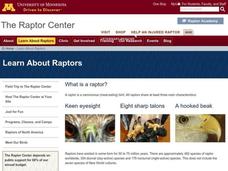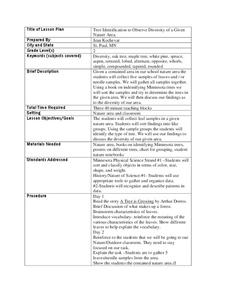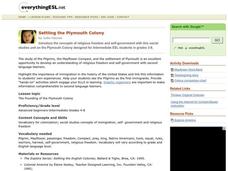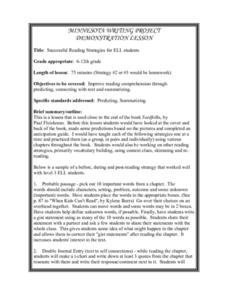Curated OER
The Rain Forest
Students explain the basics of the tropical rain forest ecosystem. They list the four general layers of vegetation found in the tropical rain forest.
Curated OER
The Rain Forest
Students acquire knowledge about the basics of the tropical rain forest ecosystem. They analyze the cause/effect relationship between humans attitudes and behavior and the evnvironment. Students list the four general layers of vegetation...
Curated OER
Tree Identification to Observe Diversity of a Given Nature Area
In this tree identification lesson plan, 2nd graders read A Tree is Growing, discuss what makes up a forest, brainstorm characteristics of leaves, gather samples of leaves and examine their samples. Students will sort leaves and compare...
Curated OER
Shoreline Seining and Sampling
Learners investigate ecological systems and the cause and effect relationship between humans and the environment by using the prey items of Ospreys.
Curated OER
Radical Raptors
Students define raptor, explain why raptors are important, describe unique physical characteristics of various types of raptors, and explain life cycle of raptors. Students then play Habitat Game, describe food and hunting habits of...
Curated OER
Winterdance
In this chronological order worksheet, students put story events in order that they are given. Students put 7 events in chronological order.
Curated OER
Predator-Prey Relationships
Students understand ecological systems. They provide experiences to assist citizens to increase their sensitivity and stewardship for the environment.
Curated OER
It's all Interconnected
Students participate in a number of activities to investigate the food web, species extinction, predators and prey, and biological diversity.
Curated OER
Wetland Wonders
Students study the characteristics of wetlands, and their importance to humans and wildlife.
Curated OER
Lake and Pond Study
Students examine the habitat and community structure of a pond that could support Ospreys through games and worksheets. They then go on a field trip to a pond to evaluate the suitability of the pond as an Osprey habitat.
Curated OER
Settling the Plymouth Colony
Students label blank maps with the names of the New England Colonies. They explain the difficulties that the Pilgrims had and how hard they worked to survive in Plymouth.
Curated OER
Settling the Plymouth Colony
Young scholars use the Internet and graphic organizers to research the Plymouth Colony the experience of the Pilgrims. Students compare and contrast different colonies and develop a timeline showcasing their research.
Curated OER
Rivers, Maps, and Math
Students use maps to locate and label the major rivers of North and South America. Using the internet, they identify forests, grasslands, mountain ranges and other landforms on the continents as well. They compare and contrast the...
Curated OER
Making Your Own Sampling Tools
Students examine cause-and-effect relationship between human attitudes and behavior in the environment. They also assist citizens in increasing their sensitivity and stewardship for the environment.
Curated OER
Successful Reading Strategies for ELL Students
Students improve their reading comprehension through predicting, connecting with text and summarizing. Students should have already read the book Seedfolks and made predictions based upon what they had seen from the cover and pictures...
Curated OER
United States Map- Rivers
Students identify major rivers on a map of the United States. In this geography lesson, students discuss what a river is and use a map marker to identify the symbol of a river on a map.
Curated OER
United States Map- Rivers
Students learn about rivers. In this maps lesson, students describe rivers and what human activities take place in a river. Students use a map to locate the rivers in the United States.
Curated OER
Globe Skills Lesson 5
In this map skills worksheet, students read a text selection about locations during the American Revolution and then respond to 8 fill in the blank questions.
Curated OER
Observing Osmosis in a Chicken Egg
Tenth graders develop a hypothesis and explain what they observed on an activity. In this investigative lesson plan students observe osmosis and report their data using a graph.
Curated OER
The Write Thing to Do
Students examine the proper way to write formal business letters. Students apply the skill to write letters to appropriate environmental protection agencies.
Curated OER
Wetland Wonders
Learners describe the characteristics of wetlands. They demonstrate their understanding of the importance of wetlands to humans and wildlife and determine they are defined by the presence of water, and specialized soils.
Curated OER
Time, Talent, Treasure, and Economics
Students examine and trace the origin of an item of clothing. They write, illustrate, and publish a book describing the trade flow that brought their item of clothing to the United States.
Curated OER
Making Your Own Sampling Tools
Students begin a class recycling project. They create data sampling equipment using their own designs and test them in the field.
Curated OER
My Favorite Meal
Students investigate ecological systems and the multiple uses of the environment by studying the osprey population.

























